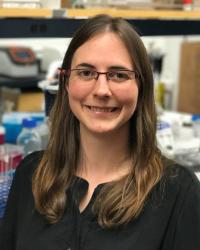We are pleased to announce that Assistant Professor Alexandra Velian has been promoted to associate professor with tenure and Associate Professors Ashleigh Theberge and Joshua Vaughan have been promoted to professor. These promotions are effective September 16, 2024.

Alexandra Velian
Associate Professor
Professor Alexandra Velian’s research program targets the design of new materials that contribute to decarbonization, clean energy and quantum information technologies. A special focus of her program is to bring molecular precision into the synthesis of single-site catalysts that transform abundant molecules into compounds poised to play central roles in a green economy.
“The traditional trial-and-error approach, which has been effective in developing conventional industrially relevant catalysts such as the Haber-Bosch process for converting nitrogen to ammonia, falls short in addressing current urgent chemical challenges, such as transforming other small molecules like carbon dioxide into environmentally friendly, valuable compounds,” Velian said. “Synthetic strategies to precisely control the composition and surface chemistry of inorganic materials are necessary to design the next generation of catalytic materials.”
Velian’s scientific and academic contributions have been recognized with several awards and distinctions, including the Sloan Fellowship (2024), the Inorganic Chemistry Lectureship Award (2023), the Camille Dreyfus Teacher-Scholar Award (2023), the Marion Milligan Mason AAAS Award (2023), the C&EN Talented 12 (2022), a Cottrell Scholar Fellowship (2020), the NSF Career Award (2019), the Young Investigator Award – ACS Division of Inorganic Chemistry (2016) and the Alan Davison Prize for the Best Thesis in Inorganic Chemistry at MIT (2015). Most recently, Velian was elected chair for the ACS Division of Inorganic Chemistry, Organometallic Subdivision (2024), and is also serving on the Editorial Advisory Boards for the Journal of the American Chemical Society and Inorganic Chemistry (2024).
Before joining the University of Washington in 2017, Prof. Velian completed her undergraduate studies in chemistry at Caltech, where she conducted research primarily with Professor Theodor Agapie. As the first member of his group, she developed the synthesis of low-valent mono- and bimetallic complexes supported by a terphenyl diphosphine framework. She received her Ph.D. under the direction of Professor Christopher C. Cummins at MIT, where she developed the synthesis of anthracene and niobium-supported precursors to reactive phosphorus fragments and studied their behavior using chemical, spectroscopic, and computational methods. Notably, this work gave rise to the synthesis of the 6π all-inorganic aromatic anion heterocycle P2N3−, produced in the “click” reaction of P2 with the azide ion. Following her PhD, Alexandra was a Materials Research Science & Engineering Center postdoctoral fellow with Professor Colin Nuckolls at Columbia University, where she worked on creating well-defined functional nanostructures by linking atomically precise metal chalcogenide clusters.
To learn more about Professor Velian and her research, visit her faculty page, research group website, or contact her directly.

Ashleigh Theberge
Professor
Professor Ashleigh Theberge’s research group, Bioanalytical Chemistry for Medicine and the Environment (BCME), studies chemical mechanisms underlying asthma, allergy, infectious diseases, urologic conditions, kidney disease, rheumatic conditions, transgender health, and environmental exposures. They develop analytical chemistry tools to advance medicine, including biomimetic microfluidic systems for integrated cell culture and analysis and at-home sampling tools for diagnostics (blood, saliva) and environmental monitoring. The Theberge group collaborates closely with clinicians to investigate how chemical processes are linked to patient symptoms. A related emerging area of research within the Theberge group centers on developing culture models and molecular isolation tools to study microbial signaling in the environment and agriculture.
Theberge is an adjunct member of the urology faculty in the UW School of Medicine. She holds numerous patents and has received several awards including a Camille Dreyfus Teacher-Scholar Award, Sloan Research Fellowship in Chemistry, Packard Fellowship for Science and Engineering, Beckman Young Investigator Award, NIH Maximizing Investigators’ Research Award (MIRA), and a Kavli Microbiome Ideas Challenge Award grant. Her efforts in mentoring, which promote values of and diversity, equity, and inclusion, have earned her a UW Undergraduate Research Mentor Award (2021), the Department of Chemistry Faculty Award for Excellence in Student Mentoring (2023), and recognition as a Howard Hughes Medical Institute (HHMI) Gilliam Mentor (2021).
To learn more about Professor Theberge and her research, read stories recently published by the College of Arts & Sciences on How a Chemistry Lab is Transforming Clinical Research about the BCME Lab and Involving Undergrads in Chemistry Research, a Q&A with Professor Theberge. You may also visit Professor Theberge’s faculty page, research group website, or contact her directly.

Joshua Vaughan
Professor
Research in the Vaughan research group is focused on the development of new tools for high resolution fluorescence microscopy and the application of these tools, along with established ones, to understand the molecular-scale organization of biological systems in their native cellular and tissue contexts. On the tool development side, they are developing chemistries for fluorescent labeling and super-resolution microscopy, novel microscopy instrumentation, and assays for single-cell epigenetics. On the application side, the Vaughan group has partnered with biologists and pathologists to apply advanced imaging tools to the study of nephrology and immune cell development. Their diverse skill sets in chemistry, biology, and optics allow them to tackle these interdisciplinary problems.
Professor Joshua Vaughan is an adjunct professor in the Department of Physiology and Biophysics and a member of the Biological Physics, Structure, & Design program, an interdisciplinary PhD program at the UW. In 2022, he was awarded a $1.3 million grant from the W. M. Keck Foundation to lead an interdisciplinary group to study technologies that can be used to analyze structures of living cells.
To learn more about Professor Vaughan and his research, please visit his faculty page, research group website, or contact him directly.